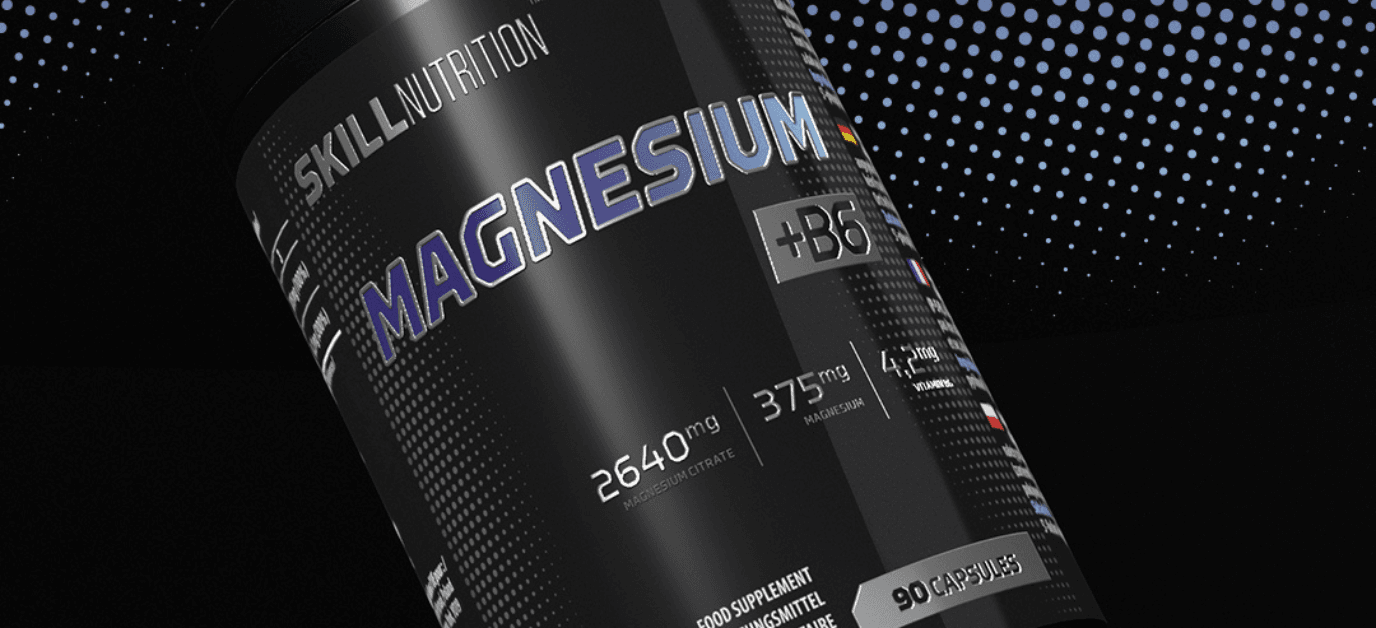

How does magnesium support muscle recovery after hard work?
05.03.2025Recommended products
Muscle recovery after intense physical exertion is one of the most important aspects of the lives of active individuals, athletes, and anyone who trains regularly. When the body doesn't receive the proper nutrients, recovery can be delayed, which affects performance and increases the risk of injury. One of the most important minerals supporting the recovery process is magnesium. Find out why it's so crucial for post-exercise recovery.
The role of magnesium in the body
Magnesium is one of the key minerals involved in over 300 biochemical processes in the human body. It plays a role in regulating muscle contractions, energy production, and protein synthesis.
Research shows that magnesium is essential for the proper functioning of muscles, the nervous system, and the bones. It directly affects muscle function by supporting their relaxation after intense contractions. [1] In practice, this means that an adequate level of magnesium helps prevent painful cramps and tension that can occur after physical exertion.
Increased muscle tension caused by magnesium deficiencies can result in stiffness and pain. For individuals who train intensely, the risk of deficiency is even greater because magnesium levels decrease through sweat and with the increased energy expenditure of the body.

Why is magnesium essential for muscle recovery?
Muscle recovery is a multi-stage process that requires not only rest but also an adequate intake of nutrients, including magnesium. Here's how it influences recovery:
- Reduction of muscle cramps and pain
As mentioned earlier, magnesium acts as a natural muscle relaxant, preventing cramps and minimizing pain. This is especially important after intense workouts or prolonged physical activity. A lack of magnesium increases the risk of muscle cramps, which can affect recovery and extend the time needed to return to full fitness. [2]

- Supporting protein synthesis
Magnesium plays a role in protein synthesis, which is crucial for muscle repair after the micro-damage caused by exercise. This process helps muscles become stronger and more resistant to strain. [3]
- Energy production
Muscle recovery is also an energy-demanding process. Magnesium participates in the synthesis of ATP – the primary energy source for cells. With magnesium, the body can convert energy more quickly, allowing for more efficient recovery. [4]
- Reducing oxidative stress
After physical exertion, cortisol (the stress hormone) levels rise, which can lead to inflammation in the muscles and delay their recovery. Magnesium helps regulate cortisol levels, reducing oxidative stress and supporting faster muscle repair processes. [5]

Magnesium and Vitamin B6 supplementation for maximum benefits
Magnesium combined with vitamin B6 is one of the most recommended forms of supplementation for physically active individuals. Vitamin B6 supports the absorption of magnesium, increasing its availability to the body. Additionally, it contributes to regulating the levels of serotonin and melatonin – hormones responsible for well-being and quality sleep, which is crucial for muscle recovery. Studies have confirmed that magnesium and vitamin B6 supplementation provides benefits in reducing fatigue symptoms in individuals exposed to intense physical exertion. [6]
Why do active individuals need more magnesium?
During intense physical activity, the body's need for magnesium increases because its levels decrease due to intense sweating and heightened metabolism. Research shows that individuals who engage in regular sports may need up to 10-20% more magnesium in their diet than those who lead a sedentary lifestyle. [7]
A magnesium deficiency can lead to muscle cramps, muscle tremors, and reduced physical performance. Regular supplementation helps replenish this mineral, supporting the body in daily recovery.

Sources:
[1] Rude RK. Magnesium deficiency: a cause of heterogeneous disease in humans. J Bone Miner Res. 1998 Apr;13(4):749-58. doi: 10.1359/jbmr.1998.13.4.749. PMID: 9556074.
[2] Garrison SR, Korownyk CS, Kolber MR, Allan GM, Musini VM, Sekhon RK, Dugré N. Magnesium for skeletal muscle cramps. Cochrane Database Syst Rev. 2020 Sep 21;9(9):CD009402. doi: 10.1002/14651858.CD009402.pub3. PMID: 32956536; PMCID: PMC8094171.
[3] Córdova Martínez A, Fernández-Lázaro D, Mielgo-Ayuso J, Seco Calvo J, Caballero García A. Effect of magnesium supplementation on muscular damage markers in basketball players during a full season. Magnes Res. 2017 May 1;30(2):61-70. doi: 10.1684/mrh.2017.0424. PMID: 28816171.
[4] Zhang Y, Xun P, Wang R, Mao L, He K. Can Magnesium Enhance Exercise Performance? Nutrients. 2017 Aug 28;9(9):946. doi: 10.3390/nu9090946. PMID: 28846654; PMCID: PMC5622706.
[5] Serefko A, Szopa A, Wlaź P, Nowak G, Radziwoń-Zaleska M, Skalski M, Poleszak E. Magnesium in depression. Pharmacol Rep. 2013;65(3):547-54. doi: 10.1016/s1734-1140(13)71032-6. PMID: 23950577.
[6] Noah L, Dye L, Bois De Fer B, Mazur A, Pickering G, Pouteau E. Effect of magnesium and vitamin B6 supplementation on mental health and quality of life in stressed healthy adults: Post-hoc analysis of a randomised controlled trial. Stress Health. 2021 Dec;37(5):1000-1009. doi: 10.1002/smi.3051. Epub 2021 May 6. PMID: 33864354; PMCID: PMC9292249.
[7] Volpe SL. Magnesium in disease prevention and overall health. Adv Nutr. 2013 May 1;4(3):378S-83S. doi: 10.3945/an.112.003483. PMID: 23674807; PMCID: PMC3650510.



